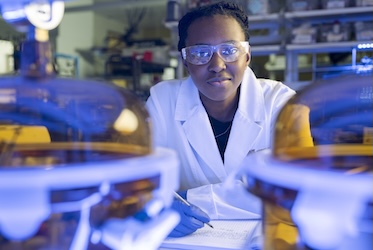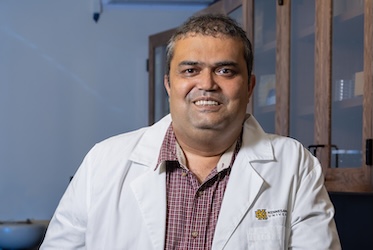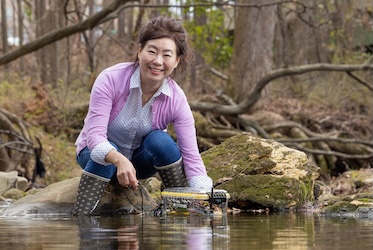
Cultivating Research
KENNESAW, Ga. | Oct 24, 2019
Technology innovation expands mushroom production
Oyster, shiitake, and portobello – these are but a few popular varieties of mushrooms finding their way to cooktops in homes and restaurants in the United States and across the world. In 2017 alone, mushroom sales accounted for more than $1.2 billion in U.S. economic impact with over 929 million pounds produced according to the American Mushroom Institute.
Yet, these spore-bearing fruiting bodies of fungi, known for their nutritional and medicinal properties, are still underutilized in the predominately plant-based agricultural industry. Kennesaw State University researchers Chris Cornelison and Kyle Gabriel in the BioInnovation Laboratory are trying to change that trend by leveraging technology to optimize high growth yields and varieties of this crop in Georgia.
According to Cornelison, research scientist in biology and BioInnovation Laboratory director, increasing global populations are putting a tremendous burden on the production and preservation of traditional crops such as produce. They require the use of limited arable land, are susceptible to ever-changing weather patterns, and can result in waste from post-harvest decay.
“Over 40 percent of all the produce in the world goes bad before anyone can enjoy it, yet mushrooms do not require specific environmental conditions,” he said. “This requires that we develop methods for producing readily preservable and nutritious foods without regional climactic limitations.”
Thanks to a three-year award from the Georgia Department of Agriculture in 2017, the two collaborators conceived a plan to build a low-cost, small-footprint prototype of an automated mushroom production facility in a shipping container, which could easily be set up and utilized anywhere, even densely populated areas. The end goal is to provide their results as a how-to guide to the Georgia Department of Agriculture to share with other interested producers.
“As I became more familiar with how mushrooms are produced, it seems that it is technologically lagging behind other areas of food production, even with current technology for sensors and environmental controls being quite advanced,” said Cornelison.
Therefore, the linchpin of the mushroom growth project is the embedded environmental control system known as Mycodo, developed by Gabriel, postdoctoral researcher in the BioInnovation Laboratory. The system can autonomously regulate the growing conditions for mushrooms, which include temperature, humidity and carbon dioxide concentrations.
“I am a firm believer in utilizing technology to improve quality of life, especially when it can result in fresher products locally sold, thereby reducing the carbon footprint of packaging and transportation,” said Gabriel. “Automation, especially on the urban scale, has the potential to not only improve crop yields, but give people back time to complete other activities.”
Gabriel first began mushroom cultivation as a hobby when he was an undergraduate student. He created a cultivation chamber in his closet with a rudimentary hardware and software system he developed to automate the process of mushroom growth.
At the same time, the two researchers also are completing test runs in the BioInnovation Laboratory with various mushroom strains foraged wildly in Georgia and a few commercially available not typically found in the state to find the best varieties that would be compatible with the proposed production methodology.
Gabriel explained their selection criteria include seeking out varieties that are highly palatable, have high production yields and ease of cultivation. With about 10,000 known species of fungi living wildly in North America, only about 10 varieties are grown commercially because some varieties cannot be successfully produced outside of nature.
“We are looking to improve Georgia agriculture by trying to source local mushroom strains that have higher productivity than commercially available strains,” he said.
Other smaller-scale experiments are being conducted in the BioInnovation Laboratory, looking at mushroom isolates such as lion’s mane and king stropharia and their growth rate performance on media or substrates of agricultural waste products such as peanut and pecan shells. After mushroom cultivation, Cornelison and Gabriel hope the used substrates can be sold as plant fertilizer.
In spring 2019, the experimental cultivation chamber within the shipping container was ready. A first production run in May yielded over 100 pounds of shiitake mushrooms from colonized shiitake substrate, sawdust blocks inoculated with shiitake mushroom mycelia.
Shiitake mushrooms were chosen because of their high value, easy availability and familiarity to consumers. With this yield as the baseline, test runs will continue for improving the production facility prototype.
“I am excited about this project because it is a demonstration of the application of modern technology to solve problems that have existed for a long time,” said Cornelison. “Ultimately, we want this project to serve as an example to farmers in Georgia and nationwide that there is a fairly low-cost entry point into the mushroom cultivation market if they want to diversify their operations.”
– Joëlle Walls
Photography by Jason Getz
Related Stories

Kennesaw State students to present research at Symposium of Student Scholars

Chemistry student engaged in sustainable catalyst research through Kennesaw State's First-Year Scholars program

Kennesaw State researchers awarded Department of Energy grant to investigate materials that boost energy-efficient technologies

KSU researcher designing AI system to transform water safety
A leader in innovative teaching and learning, Kennesaw State University offers undergraduate, graduate, and doctoral degrees to its more than 47,000 students. Kennesaw State is a member of the University System of Georgia with 11 academic colleges. The university’s vibrant campus culture, diverse population, strong global ties, and entrepreneurial spirit draw students from throughout the country and the world. Kennesaw State is a Carnegie-designated doctoral research institution (R2), placing it among an elite group of only 8 percent of U.S. colleges and universities with an R1 or R2 status. For more information, visit kennesaw.edu.

















